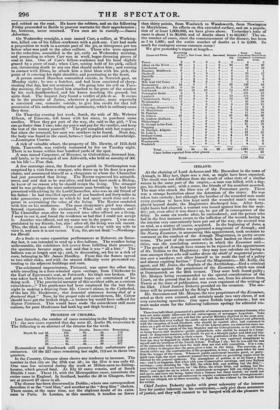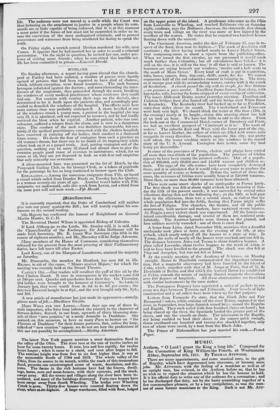IRELAND.
At the chairing of Lord Acheson and Mr. Brownlow in the town of Armagh, in May last, there was a riot, as might have been expected. The result was not different from the result of other riots of a similar nature in the same part of the empire,--a man was killed, with a dag- ger, his friends said ; with a stone, the friends of his assailant asserted. The man who struck the blow was of the Protestant party. There was a strange hesitation about the detention of the rioter. He was taken into custody ; but although the brother of the wounded man made every exertion to have him kept until the wounded man's state was placed beyond doubt, the Magistrates discharged him. After forty- eight hours had elapsed, a warrant was issued against him for the mur- der; yet, even after it was drawn up, he got off in consequence of the delay. In some six weeks after, he surrendered; and the person who had in the first instance sworn to the infliction of the wound, having in the interim very conveniently been put out of the way, the accused was on trial, as a matter of course, acquitted. In the beginning of June, a gentleman named Dobbin was appointed a magistrate of Armagh; and the Newry Examiner, in announcing this appointment, took occasion to comment on the conduct of the Armagh Magistrates, in pretty severe terms. The part of the comment which bore hardest on these autho- rities, was the concluding sentence; in which the Examiner said- " The people of Armagh have reason to be rejoiced at the appointment of Mr. Dobbin to the Magistracy : they may now calculate on having a man amongst them who will neither throw the shield of magisterial protec- tion over a murderer, nor allow himself to be made-the tool of a paltry • and almost expiring faction." Two of the Magistrates,—Mr. Kelly, the agent, and Mr. Jones, the chaplain of the Archbishop,—filed a criminal information against the proprietors of the Examiner, which was tried at Downpatrick on the 20th instant. They were both found guilty; Mr. Morgan being recommended to the special consideration of the Court, on the ground that he did not write, nor, from his absence from Newry at the time of publication, was even cognizant of the writing of the libel. Chief Justice Doherty presided on the occasion. The sen- tence will be pronounced by the King's Bench.
Mr. Stevenson and Mr. Morgan, the two proprietors of the Examiner, acted as their own counsel, and certainly made two very clever, if not very convincing speeches. Our space forbids large extracts ; but we must make room for the following ludicrous apology for editorial vio-
lence— There is no individual. possessed of a particle of common sense or common honesty, who. does not make ample allowance for the extravagance of newspaper hyperbole. Take up the Eternity Mail, and you will find the present Ministry depicted as the most atro- cious villains that ever walked the earth—men who should all be hanged and gibbeted, with the exception of Lord Plunkett, who should be roasted alive, and consumed to ashes on a pile of his own Dedimuses. We of the Liberal press are somewhat more mo- derate. We merely speak of the late Ministry and the Corruptionists, as we call them, as being 'Loaves and madmen—public pickpockets, who should be soused in a horse- pond—or dangerous maniacs, who should be put in a "straight jacket and bled and blis- tered, in order to bring them to their senses. You, gentlemen of the Jury, and all who. hear me, may be disposed to think that I am paying a very equivocal compliment to myself and my brethren of the Fourth Estate. Perhaps I am ; but do you and the rest of the community take care that the fault does not rest with yourselves. It is a com- plete fallacy to imagine that the press gives a tone to the times. The converse, or I should rather say, the contradiction of the proposition, is true : the press takes its tone from the temper of the times. Whenever public excitement becomes great, or party- spirit runs high, the most moderate joustial that descants on prevailing topics must be infected by the general epidemic. The atmosphere of politics is at all times a fiery one : and it so happens, that what with your Conservative meetings, and your Reform meetings:—your shouting for "the Bill, the whole Bill, and nothing but -the Bill,"— your roaring till you are hoarse, for " the Bible, the whole Bible, and nothing but the Bible," you make the air in which we unfortunate newspaper folk are obliged to live, and move, and have our being, hotter than a furnace ten times heated: we could not possibly exist in it. did we not endeavour to acquire a salamander sort of temperament ; and we are obliged, out of sheer necessity, to repel the fire without by the still fiercer fire within. Chief Justice Doherty. spoke with great solemnity of the intense love for justice inherent in his countrymen,-:-only give them assurance of justice; and they will consent to be hanged with all the pleasure in
life.. The audience were not moved to a smile while the Court was thuS lecturing on the attachinent to justice in a people where its com- mands are so little capable of being enforced, that it is at this moment a moot point if the forms of law must not be suspended in order to in- . sure the conviction of the most undisguised criminals, and to protect prosecutor's and witnesses from being murdered for daring to speak the truth.
On Friday night, a wretch named Meehan murdered his wife, near Camas. It appears that he had married her in order to avoid a criminal
prosecutioa.- On the night in question, he invited her out, under pre- fence of visiting some friends ; when he comnitted this horrible act. He has been committed to prison.—Limerick Herald.




























 Previous page
Previous page